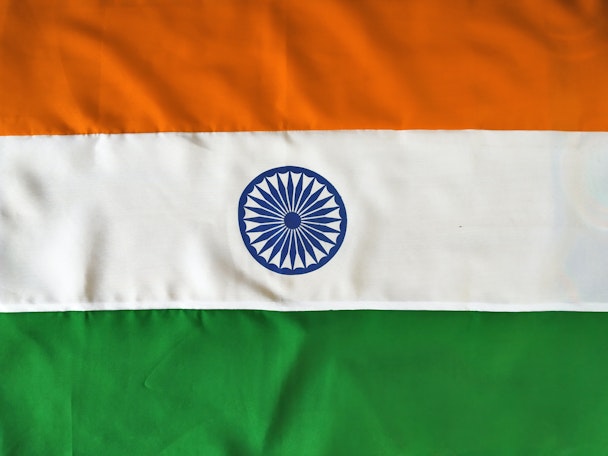Why Narendra Modi may rebrand India as Bharat
As rumors that India is going to adopt a new name on the global stage intensify, editor-at-large Amit Bapna in Mumbai and editor-in-chief Gordon Young in London explain the reasons and examine the potential ramifications.

The national flag of India... or Bharat? / Photo by Onkarphoto on Unsplash
Is India on the brink of rebranding to Bharat? The answer to that question could become a lot clearer this week as Indian leaders convene a historic special session of its parliament.
The session will mark the transfer of parliamentary proceedings from the British-era assembly building to the New Parliament House, so many think it might be a good opportunity to drop what many deem a British-era emphasis.
But rumors have been rife ever since the recent G20 that concluded in Delhi. Invitations were sent out using the Bharat name, and the prime minister Narendra Modi addressed the conference from behind a card which read Bharat.
Advertisement
Inside the country, both names have been used for millennia – the name India, far from a British Raj invention, would have also been known to the ancient Greeks.
The Indian constitution starts with ‘Bharat, that is India’ and protocol since its independence has been to use the name India when the text is in English and Bharat when it is in Hindi.
However, to see Bharat written in English at the G20 sent India’s social media into meltdown.
Some suggest that the move is simply to wrongfoot Modi’s BJP political opponents. An alliance of 28 rival parties joined forces to form a secular coalition named INDIA – standing for the Indian National Development Inclusive Alliance.
But whether the motivation is for short-term tactical advantage or not, the impact already has strategic consequences. At least one major firm has pre-empted a formal announcement. Logistics company Blue Dart Express (part of DHL Express) has rebranded its Indian premium service from 'Dart Plus' to 'Bharat Plus'. In a press statement, it said: “This strategic transformation marks a momentous milestone in Blue Dart's ongoing journey, underscoring its unwavering commitment to serving the diverse needs of Bharat.”
- Further reading: Why the India-UK trade deal will be a boost for marketers
It is a huge talking point. And some commentators are impressed with how Modi has laid the groundwork for any change.
Mythili Chandrasekar, a consumer behavior and brand strategy expert and former national planning director at J Walter Thompson India, says: “Being a country brand, the move is of course dripping with political and nationalistic overtones. But that apart, as rebranding exercises go, the prelude buzz is cleverly created.
“Slip it in, raise a debate, mobilize public opinion, make the support seem civilized, and the polarization seems political. The timing is bold, in the midst of a global event, rather than, say, the 75th year of independence.
“A brand with two names... did it affect the country brand adversely till now? No. Is it good for any brand to have just one name? Of course, yes.
“Technically, if it was only about singularity, either could have been the choice. But, as a country brand, choosing the internal name for its authenticity rather than the externally known one for wider familiarity is the statement of identity that will go a long way. And like all rebranding exercises, it's going to be a costly one.”
Advertisement
Costly indeed, as the practical implications would be huge – this, after all, is the world's most populous country with a bureaucracy to match. Rebranding everything from government buildings to passports would cost an unimaginable amount. .
Rajesh Nanarpuzha, associate professor in marketing at IIM Udaipur, warns that there are also risks in moving too fast. He tells The Drum: “Historically, place names have continuously metamorphosed, and acceptance has come over time. From a branding perspective, therefore, renaming India to Bharat will have few negative repercussions over the long term.
Suggested newsletters for you
“However, a brand is only the sum of associations we collectively have about it. And a brand is only as powerful as the strength of the elements of the brand that people associate with it. 'India' has strong mental associations, many of them positive, that have been built over a long time. It would therefore be foolhardy to sever those connections through an abrupt change. Integrate India into Brand 'Bharat' thoughtfully, and we have a winner.”
But Harish Bijoor, founder of Harish Bijoor Consults Inc, a marketing consulting firm with a global footprint, suspects the India brand will live on. He says: “Of all the brands to handle in the world, a country brand is the most difficult. A country brand represents a collective history, a trove of memories across generations of use, and most importantly experiences.
“Transitioning all of this into a new brand name can take decades, and still not succeed. I do not believe that is the intent of prime minister Modi at all.
“India is doing it right. PM Modi is not changing the brand name of India at all. The sacred Constitution of India recognizes two brand names that belong to the country – India and Bharat.
“PM Modi therefore spearheads the campaign to use more of the Bharat and possibly, as a result, use less of India. But both brand names belong to India the country and Bharat the nation. Expect a lot of seamless use in the future.
“This is not re-branding a country, but a more seamless use of both the names that belong to and describe the country.”
However, many overseas observers will think the Indian government is fixing a brand that isn’t broken. Writing for The Spectator, broadcaster Jawad Iqbal said: “The name ‘India’ speaks of something bigger, a cultural and national identity that has international resonance and history, one that is recognized throughout the world. India’s rulers would be mad to throw this away.”

